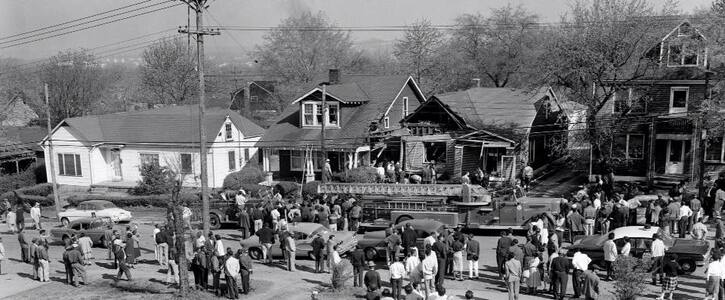100 signatures reached
To: Mayor John Cooper and Metro Nashville Council
Make April 19 "Z. Alexander Looby Day" in MetroNashville

Z. ALEXANDER LOOBY (1899-1972) was one of the most exceptional attorneys to ever practice law in the Volunteer State. In 1940, while earning a reputation as one of Tennessee's elite Civil Rights attorneys, Looby became one of the first African Americans to be elected to the Nashville City Council, a body that had not seated an African American since 1911.
Much of Looby's legal work contributed to the integration of public spaces throughout the South, including the desegregation of Nashville's public schools. During the Nashville Movement, Looby provided rigorous defenses for students arrested as a result of their efforts to integrate Nashville's lunch counters.
During the early morning hours of April 19, 1960, terrorists detonated twenty-one sticks of dynamite at the home of civil rights attorney, Z. Alexander and Grafta Looby. The blast was so strong that it shattered windows in Meharry Medical College that were across the street. Although deeply shaken, the Loobys survived this assassination attempt, and this moment galvanized student activists to take action.
In response to this assassination attempt, student leaders Bernard Lafayette and C.T. Vivian arrived at TSU around lunchtime to recruit students from the cafeteria (Elliot Hall) and the dormitories to march to City Hall to confront Nashville Mayor Ben West. According to one account, approximately 1,500 students departed Kean Hall for Nashville's public square. As they marched silently, their numbers grew. As they reached 18th Ave North (D.B. Todd) and Jefferson where they were met by Fisk Students., and as they crossed 17th Ave North, they were joined by students from Nashville's historic Pearl High School. By the time protesters arrived at the Public Square, their number had grown to more than 3000 persons.
That march and moment--which would culminate in one of the most important interrogations in this city's history--cemented North Nashville's place as one of the grand stages where the drama of American democracy played out during the twentieth century.
This moment in our history was as important as the founding of the city, the rescuing of Nashville from Confederate hands during the Civil War, and the Reconstruction of the city during the Post-Civil War Period. Like these moments, the Looby Bombing changed how we view ourselves as Nashvillians and Americans, and it needs to become a permanent chapter in our public narrative and memory.
Much of Looby's legal work contributed to the integration of public spaces throughout the South, including the desegregation of Nashville's public schools. During the Nashville Movement, Looby provided rigorous defenses for students arrested as a result of their efforts to integrate Nashville's lunch counters.
During the early morning hours of April 19, 1960, terrorists detonated twenty-one sticks of dynamite at the home of civil rights attorney, Z. Alexander and Grafta Looby. The blast was so strong that it shattered windows in Meharry Medical College that were across the street. Although deeply shaken, the Loobys survived this assassination attempt, and this moment galvanized student activists to take action.
In response to this assassination attempt, student leaders Bernard Lafayette and C.T. Vivian arrived at TSU around lunchtime to recruit students from the cafeteria (Elliot Hall) and the dormitories to march to City Hall to confront Nashville Mayor Ben West. According to one account, approximately 1,500 students departed Kean Hall for Nashville's public square. As they marched silently, their numbers grew. As they reached 18th Ave North (D.B. Todd) and Jefferson where they were met by Fisk Students., and as they crossed 17th Ave North, they were joined by students from Nashville's historic Pearl High School. By the time protesters arrived at the Public Square, their number had grown to more than 3000 persons.
That march and moment--which would culminate in one of the most important interrogations in this city's history--cemented North Nashville's place as one of the grand stages where the drama of American democracy played out during the twentieth century.
This moment in our history was as important as the founding of the city, the rescuing of Nashville from Confederate hands during the Civil War, and the Reconstruction of the city during the Post-Civil War Period. Like these moments, the Looby Bombing changed how we view ourselves as Nashvillians and Americans, and it needs to become a permanent chapter in our public narrative and memory.
Why is this important?
In order to demonstrate our gratitude for the work Looby accomplished during his lifetime and reaffirm our commitment to preserving and protecting this history of this period for future generations, April 19 should be designated as Z. Alexander Looby Day in MetroNashvile.
This day should become a permanent feature of MetroNashville's calendar, and it should be a day residents pause, reflect, and commit to making the city a more just and equitable space for all its residents.
This day should become a permanent feature of MetroNashville's calendar, and it should be a day residents pause, reflect, and commit to making the city a more just and equitable space for all its residents.
